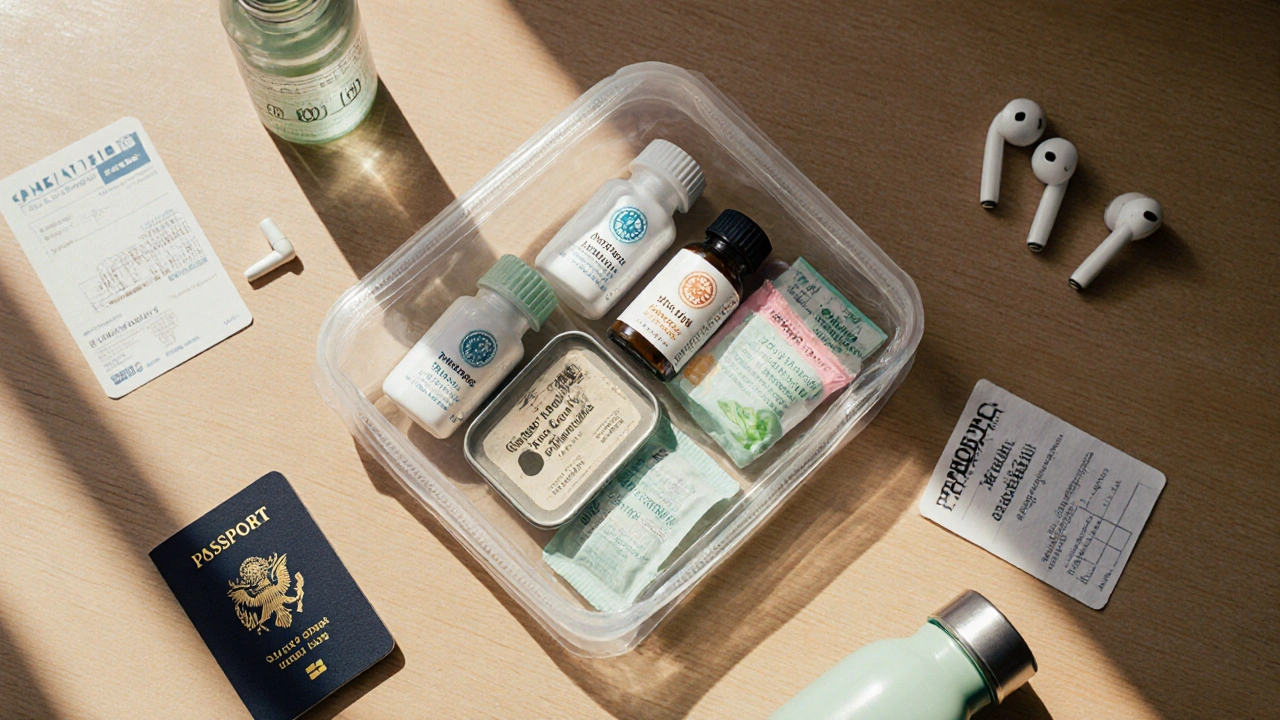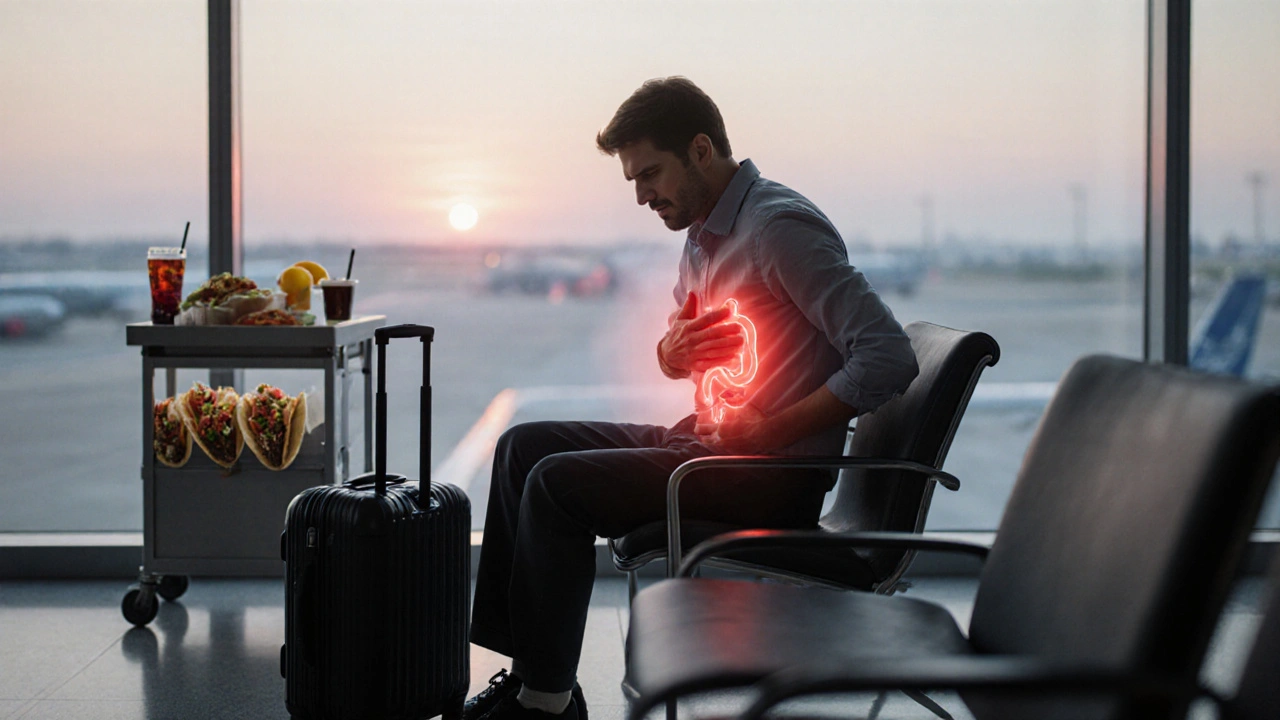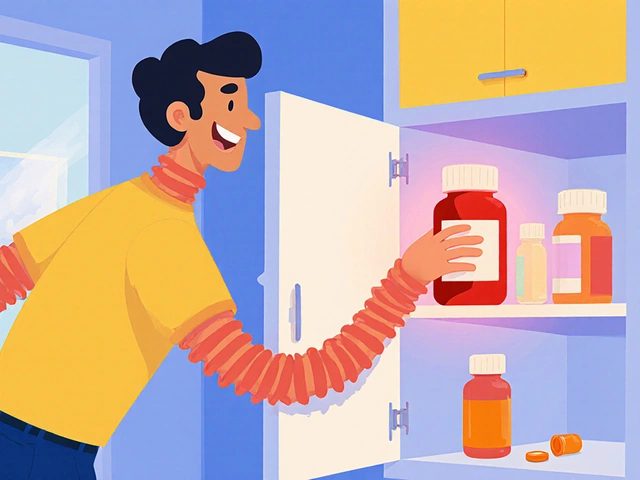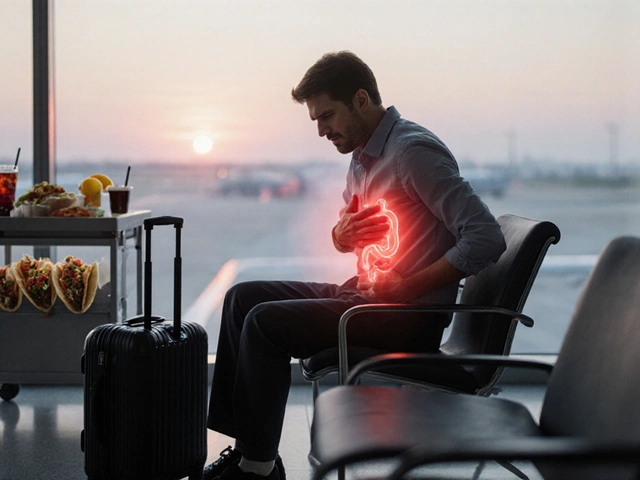Acid Indigestion Medication Selector
Select your situation
When you're on the road, acid indigestion can turn an exciting trip into an uncomfortable mess. Acid indigestion is a condition where stomach acid irritates the esophagus, leading to heartburn, regurgitation, and bloating. Whether you’re hopping between time zones or enjoying street food, the combination of unfamiliar meals, erratic schedules, and travel stress makes the symptoms pop up more often. This guide breaks down what to watch for, what to pack, and how to find relief fast so you can keep exploring without constantly reaching for the bathroom.
Know Your Triggers Before You Go
Identifying the foods and habits that set off your stomach is the first line of defense. Common culprits for travelers include:
- Spicy sauces, tomato‑based dishes, and citrus heavy meals.
- Carbonated drinks and alcohol, especially on long flights.
- Eating large portions or lying down right after a meal.
- High‑fat fast food, which slows stomach emptying.
- Stressful itineraries that keep your nervous system on edge.
Keep a quick notebook or a notes app on your phone. Jot down what you ate, when, and how you felt. After a few days you’ll spot patterns that let you dodge the worst offenders.
Smart Packing: Meds and Natural Aids
Travel size doesn’t mean you have to sacrifice effectiveness. Here’s a compact toolkit that covers both pharmaceutical and natural options.
Antacids are over‑the‑counter tablets that neutralize stomach acid instantly. They work within minutes and are ideal for sudden flare‑ups.
H2 blockers (like ranitidine or famotidine) reduce acid production and provide relief that lasts 8‑12 hours. Keep a small bottle in your carry‑on for day‑long coverage.
Proton pump inhibitors (PPIs) such as omeprazole are stronger, longer‑acting drugs that keep acid down for up to 24 hours. One dose a day, taken before breakfast, can prevent nighttime symptoms on multi‑day trips.
For a natural edge, consider these pocket‑friendly items:
- Ginger chews or candied ginger strips help soothe the lining of the stomach and can calm mild nausea.
- Peppermint tea bags (or a small bottle of peppermint oil) relax the lower esophageal sphincter, but avoid if you have severe reflux.
- Probiotics in capsule form maintain a healthy gut flora, which can reduce overall digestive irritation.
Pack everything in a zip‑lock pouch to meet airline liquid rules and to keep moisture out.

Eating Strategies on the Move
Even the best meds can’t fully counter a bad diet. Follow these practical steps when you’re eating out or grabbing a quick bite:
- Choose grilled or baked proteins over fried options. Lean chicken, fish, or tofu are easier on the stomach.
- Ask for sauces on the side. Dipping lets you control the amount of acidic or spicy condiment.
- Swap white bread for whole‑grain or a plain tortilla; the extra fiber slows digestion and reduces reflux spikes.
- Limit caffeine and carbonated drinks. Opt for still water or herbal tea instead.
- Eat slowly and chew thoroughly. Smaller, well‑chewed bites lower the pressure on your lower esophageal sphincter.
When a restaurant menu looks overwhelming, look for keywords like “light,” “steamed,” or “broth‑based.” Those dishes usually contain less fat and acid.
Stay Hydrated and Manage Stress
Dehydration and tension both increase stomach acid production. Here’s how to keep them in check during travel:
- Hydration is essential. Aim for at least 2liters of water a day; a reusable bottle with time markers can remind you to sip.
- Practice a quick breathing exercise before meals: inhale for 4 seconds, hold for 4, exhale for 6. This activates the parasympathetic nervous system and calms acid spikes.
- Schedule short walks after eating. Moving at a gentle pace helps food settle and reduces pressure on the stomach.
- Use a travel‑size mindfulness app for 5‑minute sessions. Even brief meditation can lower cortisol, which otherwise ramps up acid secretion.

Quick Relief Hacks When Symptoms Strike
If you feel the burn creeping up, try these low‑tech fixes that work in airports, hotels, or train stations:
- Chew a sugar‑free antacid tablet and sip a few sips of water. The combined action neutralizes acid quickly.
- Place a warm compress (a microwavable heat pack) on the upper abdomen for 5 minutes. Heat relaxes the stomach muscles.
- Drink a cup of warm ginger tea or suck on a candied ginger strip. The ginger compounds gingerol and shogaol reduce inflammation.
- If you have a Peppermint lozenge, let it dissolve slowly. The menthol eases the esophageal lining-just skip it if you notice heartburn worsening.
- Rise upright. Prop yourself on a pillow or sit in a chair with your back straight; gravity keeps acid down.
These tricks are meant for mild episodes. If the pain is severe, lasts more than an hour, or is accompanied by vomiting, seek medical attention.
Pre‑Trip Checklist for Acid‑Friendly Travel
- Schedule a brief tele‑health visit 1-2 weeks before departure to discuss your medication plan.
- Buy a 30‑day supply of your chosen antacid, H2 blocker, or PPI and pack it in your carry‑on.
- Pack ginger chews, peppermint lozenges, and a probiotic bottle in a sealed bag.
- Download an offline food‑risk guide for your destination (e.g., “Spice Levels in Southeast Asian Cuisines”).
- Bring a reusable water bottle with time‑marked reminders.
- Set daily reminders on your phone to take medication at the same clock time, regardless of time‑zone changes.
- Reserve a quiet, low‑stress hotel room on lower floors where you can rest after meals.
| Type | Typical Onset | Duration of Relief | Best Use Case |
|---|---|---|---|
| Antacids (e.g., Tums, Maalox) | 1-5 minutes | 30minutes‑2hours | Sudden flare‑ups, fast relief |
| H2 Blockers (e.g., Famotidine) | 30-60 minutes | 8‑12hours | Day‑long coverage, moderate symptoms |
| Proton Pump Inhibitors (e.g., Omeprazole) | 1‑2 hours | 24hours+ | Preventive use for chronic reflux, nightly dosing |
Frequently Asked Questions
Can I take antacids and a PPI together?
Yes, but space them out by at least two hours. Antacids neutralize acid quickly, while PPIs need time to reduce acid production. Taking them together can diminish the PPI’s effectiveness.
Is it safe to rely only on natural remedies while traveling?
Natural options like ginger or peppermint can ease mild symptoms, but they aren’t a substitute for prescription‑strength medication if you have frequent or severe reflux. Keep a backup OTC or prescribed drug in your kit.
How much water should I drink to help prevent acid indigestion?
Aim for about 2liters (roughly eight 8‑oz glasses) daily. In hot climates or at altitude, increase intake by 20‑30% to offset dehydration‑driven acid spikes.
What’s the best way to handle acid indigestion on a long‑haul flight?
Stay upright, sip water regularly, and keep a small antacid tablet handy. Avoid the in‑flight coffee and opt for herbal tea. If you’re prone to night‑time reflux, take an H2 blocker before boarding.
Can stress really trigger acid indigestion?
Absolutely. Stress raises cortisol, which can increase stomach acid secretion. Simple breathing exercises, short walks, and short meditation breaks can keep stress‑related spikes in check.








October 14, 2025 AT 13:08
Sarah Kherbouche
Yo just grab some Tums and quit whining about it.
October 16, 2025 AT 01:15
Satyabhan Singh
When one traverses the varied gastronomic landscapes of distant lands, it becomes evident that the human digestive system is both resilient and delicate. The interplay of spices, acidic fruits, and unfamiliar cooking methods can precipitate an overproduction of gastric acid, leading to the discomfort commonly known as acid indigestion. Travelers often underestimate the cumulative effect of late-night meals coupled with irregular sleep patterns, which together exacerbate the gastroesophageal reflux phenomenon. Moreover, the physiological stress induced by time zone shifts can modulate cortisol levels, further stimulating acid secretion. It is prudent, therefore, to adopt a prophylactic regimen that balances both pharmacological and lifestyle interventions. Antacids, with their rapid neutralization of gastric acidity, serve as an immediate remedy for sporadic flare‑ups, yet they do not address the underlying hypersecretion. H2 blockers, such as famotidine, provide a more sustained reduction in acid output and are advantageous for those anticipating prolonged exposure to irritants. Proton pump inhibitors, while requiring an onset period, are indispensable for chronic sufferers who require near‑continuous suppression of acid production. In addition to these agents, one should consider the incorporation of dietary fibers, which can attenuate the post‑prandial acid surge. Hydration, often neglected during travel, plays a critical role in diluting gastric contents and facilitating appropriate motility. Finally, mindfulness practices, such as controlled breathing and brief meditation, have been shown to ameliorate stress‑induced gastric disturbances. By integrating these measures, the itinerant individual may preserve both comfort and health, ensuring that the journey remains a source of enrichment rather than affliction.
October 17, 2025 AT 05:02
Keith Laser
Sure, because nothing says "I'm on a spiritual quest" like popping a fancy‑named H2 blocker while the plane's full of strangers judging your snack choices.
October 18, 2025 AT 11:35
Joy Arnaiz
One must consider the hidden agenda behind airline meals; the pervasive use of preservatives and acidity regulators appears designed to keep passengers uncomfortable and dependent on onboard medical kits. It is no coincidence that the same corporations that sell these chemicals also profit from the sale of antacids in duty‑free shops.
October 19, 2025 AT 12:35
Christopher Eyer
Oh please, the only conspirey here is that you cant handle spicy food ; your gut is weak. Grab a Tums and stop making up stories.
October 20, 2025 AT 10:48
Mike Rosenstein
While it can be tempting to attribute mundane discomfort to grand conspiracies, the practical solution remains straightforward: maintain a well‑stocked kit of antacids, stay hydrated, and avoid lying down immediately after meals. These steps have consistently helped travelers manage symptoms without resorting to unfounded theories.
October 21, 2025 AT 18:45
Ada Xie
Kindly note that the term "acid indigestion" should be rendered as "acid reflux" in formal medical discourse. Additionally, the phrase "stay hydrated" is redundant when preceded by "drink water regularly".
October 22, 2025 AT 21:08
Stephanie Cheney
Thank you for the clarification. I’ll keep the terminology in mind and focus on staying consistent with my hydration routine.
October 24, 2025 AT 02:18
Yamunanagar Hulchul
Wow!!! This guide is a brilliant kaleidoscope of practical tips, dazzling advice, and vibrant energy!!! I can’t wait to pack my ginger chews, sip peppermint tea, and strut through airports like a fearless acid‑defying superhero!!!
October 24, 2025 AT 21:45
Elaine Curry
Seriously you’re missing the point the best way to avoid acid is not to eat at all just fast it out
October 26, 2025 AT 08:52
Anthony Aspeitia-Orozco
While fasting can reduce transient acid exposure, it also risks gastric mucosal irritation if prolonged. A balanced approach-light, low‑acid meals combined with strategic antacid use-provides sustainable comfort without compromising nutritional needs.